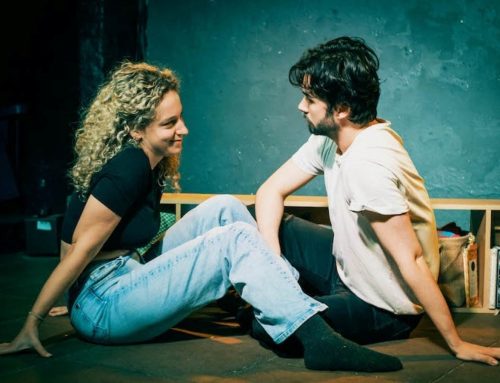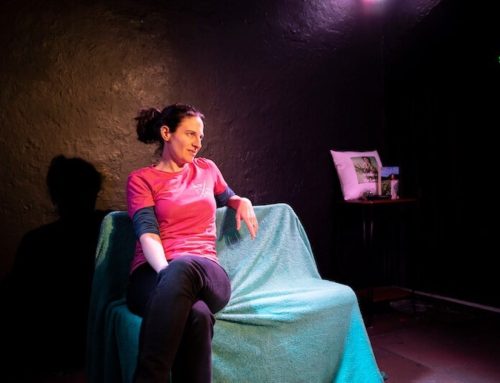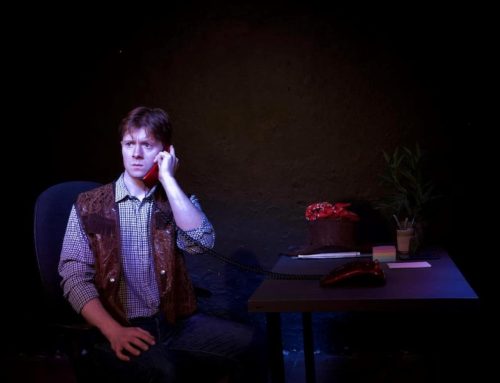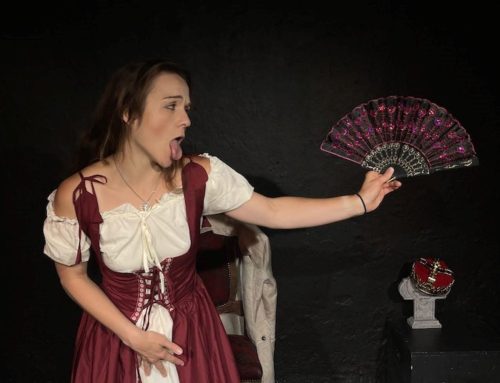Born and bred in Asturias to a Spanish mother and English father, bi-lingual performer and writer Andrea Holland devises and delivers works in both languages. Her short comedy Chop-chop presents a character struggling to reconcile a personality split between her emotional and rational components. English Andrea is rational, time-focused, hard-working, emotionally reticent, and unwilling to put down her tax returns to cook a tortilla. Gregarious Spanish Andrea lives on “an emotional roller-coaster”, quite possibly has ADHD, and insists on putting that important email off until tomorrow. The rational need for control opposes the emotional desire for freedom – but how can these battling personalities co-exist within a single mind? Think of a kind of comic Hedda Gabler without the tragic unravelling.
One supposes it makes sense for Holland to explore her character’s inner conflict within the context of her bi-cultural background. Unfortunately, the conceit requires her audience to draw on a host of unhelpful and frankly outdated stereotypes about England and Spain to contextualise what is happening in the piece. “You swallow your feelings and one day they’ll explode,” food-loving Spanish Andrea tells bland, buttoned-up English Andrea. “You’re lazy” retorts English Anna, infuriated by her double’s ‘mañana, mañana’ procrastination.
The problem with these kinds of generalisations is that they risk mistaking the part for the whole. Not every Spaniard is passionate about food, and one supposes there are many reserved, introverted, hard-working Asturian accountants. Assuming English people share the same emotional disposition ignores the nation’s vast diversity of class, ethnicity, region, and individual personality. Reducing a character’s inner conflict to a binary stereotype erases individuality rather than elucidating it. Rounded characters have recognisable individual personalities that draw on multiple cultural identities, these two do not.
Characters aside, the narrative lacks palpable conflict: do we care whether Andrea sends her email or finds her mother’s tortilla recipe? Not a jot. As a performer, Holland is likeable and has an engaging stage presence, but too much of what goes on feels like a filler without a dramatic function. Anticipate finger puppets, and audience interaction in the form of charades, blowing up balloons, and roaring the character on as she skates around the stage. All amusing in its way, but beyond a nod to Holland’s background in physical theatre one struggles to see the point. Much of the dialogue is delivered in Spanish. Asturian Anna helpfully translates some of this into heavily accented English, but those language classes you did back in the day will prove mightily useful here.
Writer: Andrea Holland
Director: Giovanna Koyama
More Recent Reviews
Playfight. Soho Theatre.
Writer Julia Grogan’s breathtakingly assured debut play arrives at Soho Theatre following stellar reviews at the Edinburgh Fringe and [...]
All The Happy Things. Soho Theatre.
Naomi Denny’s three-hander comedy-drama All The Happy Things covers familiar themes within a recognisable premise. A grieving protagonist comes [...]
Telly. Bread and Roses Theatre.
The challenge with absurdist comedy is that many people do not find it funny. Laughing at the sheer weirdness [...]






